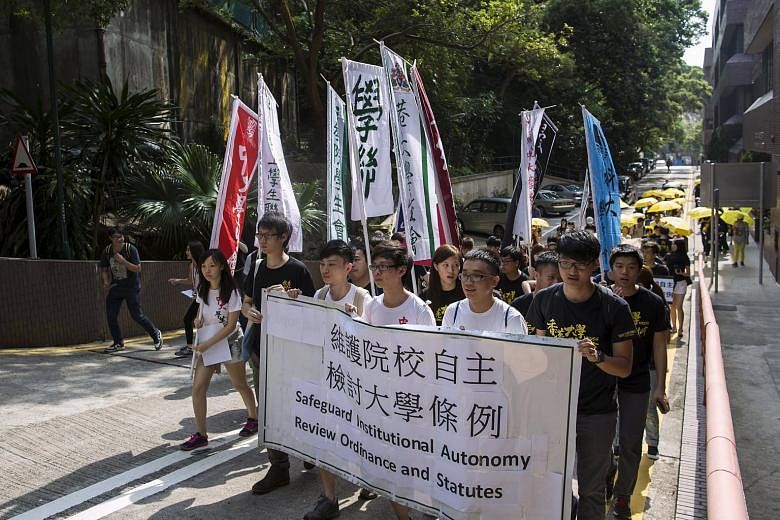By Tony Kwok
China Daily/ANN
The University of Hong Kong (HKU) Council touched off public dispute and controversy when it decided to postpone the appointment of the pro-vice-chancellor "until the new provost has taken office".
To say the least, the reason given for the postponement is somewhat unusual, and understandably has raised concerns. However, is it possible that there may be a valid reason for this explanation?
When I was at the Independent Commission Against Corruption (ICAC), we sometimes encountered cases where a government department had decided to replace somebody in a senior post and passed us the nominated candidate's file for integrity checking.
These checks might reveal that the person was being investigated on allegations of corruption. However, the investigation might be in a preliminary stage, hence it was not possible to assess their integrity at that moment.
In those circumstances, the head of the government department would be briefed in strict confidence that the person was currently under ICAC investigation.
This would cause the head a real dilemma. If another officer was substituted for promotion because the original person chosen was under investigation, it might turn out that the candidate was proven innocent, and this would be totally unfair to them.
But if the head decided to promote such a candidate despite the investigation, a prosecution might follow soon after the promotion, causing huge embarrassment to the department. In most cases, the department would postpone the appointment, leaving the post vacant in the meantime.
As the department could not divulge the ICAC investigations to the stakeholders concerned, it usually devised some excuse for the postponement, or perhaps arranged for the candidate to attend an overseas training course, hoping that the ICAC could give some clear indication on the case before their return.
Let me make clear that I am not suggesting that anyone in the HKU debacle is under ICAC investigation.
I retired from the ICAC 13 years ago, and I am aware that I am liable under Section 30 of the Prevention of Bribery Ordinance for breaching the confidentiality of any ongoing investigation.
At the same time, I must point out that HKU is a public body as defined in the Prevention of Bribery Ordinance, and all its employees are public servants.
Judging from events as revealed in the media, Professor Benny Tai Yiu-ting is alleged to have received sums of money (donations) from an unknown source.
If he cannot satisfy the test of reasonable excuse and lawful authority, it is not inconceivable that he may come under criminal investigation based on public complaints and, as such, other people involved in the case might be implicated in the investigation.
In addition, it is public knowledge that the ICAC is currently investigating a massive political donation case and the possibility of the subject persons being involved cannot be ruled out, although I have no facts to support my hypothesis.
The HKU Council has every power within its jurisdiction not to promote anyone whom it considers inappropriate.
If the council wanted to, it could simply vote such a person out. This it has not done. Instead, it postponed the decision and announced a reason for doing so.
This may indicate that it is trying to uphold the principle of justice until any possible "cloud" over the head of the subject person is cleared before it decides whether to approve an appointment.
Such a decision would be in everyone's interests, particularly the university's.
My experience with the ICAC taught me that we should not judge matters at face value.
We should exercise patience with the HKU Council, whose chairman and members are honorable citizens with distinguished records of public service.
Sooner or later, it will come up with a decision - a decision that it knows well it has to justify to the public and all stakeholders.
Let us wait and see what the outcome is before taking any more drastic protest action.
Unfortunately, the HKU students, not having learned their lessons from the failure of the Occupy Central protest, again showed themselves willing to be used by opposition parties and decided to take drastic action last Tuesday.
Their actions were most regrettable.
Their behaviour created ugly scenes in the glare of the media, for all to see.
Their acts reminded many of the Red Guards in the Cultural Revolution (1966-1976) and clearly brought disrepute to the long-standing reputation of HKU.
The students' excesses were then compounded by the response of opposition representatives - especially those in the education sector, who insisted that the students' actions were understandable and refused to condemn their lawlessness.
Yet again, that speaks volumes about Hong Kong's "democratic" movement, which uses "democracy" as an excuse to take violent action without any respect for the law and order of a civilised society.
Such uncivilised behaviour should be vigorously condemned by all civic-minded organizations and people who value our much-vaunted rule of law, which is the linchpin of our society.
The author is a former deputy commissioner of the Independent Commission Against Corruption and is presently a university lecturer in Hong Kong and on the mainland.

